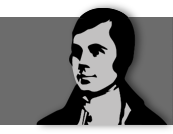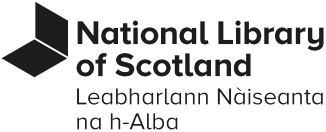The Glenriddell Manuscripts: MSS 86 and 87
These two final and polished manuscript versions of some of Robert Burns's poems and letters form the most significant items of the National Library of Scotland's holdings of the poet's output.
The manuscripts were compiled for presentation to Burns's friend, Robert Riddell of Glenriddell (1755-1794), during the years 1791 to 1793. It is known that the poet's friendship with the Riddell family came to an abrupt end in December 1793 as the result of a drunken or unseemly incident at Friar's Carse, the estate owned by Riddell in Nithsdale. The circumstances of this unfortunate incident are shrouded in mystery and uncertainty, but one of the results of the event was the return to the poet — at his own request — of the poetry volume which had already been presented to Riddell; the second had neither been completed nor sent. (See Glenriddell Manuscripts title page image in the 'Final years' section.)
In a letter, dated May 1794, to Riddell's sister in which Burns requests the return of the poetry volume, he refers to its contents as 'a collection of all my trifles in verse which I had ever written … some of them puerile and silly …' This is somewhat insincere and in reality Burns was highly aware of the value of his poems, but it shows his keenness to have returned to him a volume he knew to contain a great compilation of some of his best work. After Burns's death the two volumes were sent to his biographer, Dr James Currie. In 1913 they were sold to an American collector, John Gribbel of Philadelphia, who generously gifted them to the Scottish people. They formed one of the first items to be presented to the National Library of Scotland in 1926. (See also 'Robert Burns's Glenriddell Manuscripts' past display pages on the National Library's main website.)
The first volume
The first volume, MS 86, contains copies of poems both in Burns's hand and in that of a scribe. It contains over 50 poems, most famously a full version of 'Holy Willie's Prayer'. This is the most devastating and amusing of Burns's diatribes against the apparent hypocrisy of certain sections of his native Church. It is directed against William Fisher, a farmer in Montgarswood and an elder of Mauchline Kirk. Burns uses this hypocrite — who had initiated disciplinary action against the poet's friend, Gavin Hamilton, for failing to attend the Kirk regularly — to savage the orthodox Calvinist doctrine of double predestination. The satire was so severe that it circulated in handwritten form for some three years before its publication as part of a pamphlet. Also included in the manuscript is a transcript — both in the poet's own hand and that of the copyist — of the autobiographical letter to Dr John Moore (pages 27-48; see the Cowie Collection page for further detail of this revealing letter). There is also a transcript of 'Tam o' Shanter' (pages 49-59; see also our Tam o' Shanter page) in the hand of the copyist.
Some of the other poems within the volume include:
- Those directed against the Kirk: 'Holy Willie's prayer' (pages 21-25 of this manuscript) is the most famous of these poems, but in similar vein is 'Epistle to John Goldie in Kilmarnock, Author of, The Gospel recovered'. In this poem Burns agrees with the sentiments which Goldie (1717-1809) had expressed about the ultra-conservative faction within the contemporary church in Scotland (the so-called 'Auld Lichts'). Written in August 1785, this is one of the poet's earliest satirical works on orthodox Calvinism and is the only version of the poem in Burns's hand. (See an image of the first page of 'Holy Willie's prayer' in our 'Early manhood' section.)
- Another satire on this theme is 'The Kirk's alarm' (pages 139-142 of this manuscript) in which the poet again called upon his own experience to lampoon the Church of Scotland. In this case a theological controversy within the Presbytery of Ayr is the subject. ''Doctor Mac! Doctor Mac!'' (a figure in the poem) — the Rev William McGill — had published a treatise which the 'Auld Lichts' considered to be unorthodox. Although farming at Ellisland by the time this miserable affair had reached its conclusion, Burns had clearly followed the debate with some interest and championed the cause of the unfortunate minister. Ultimately McGill was forced into making a grovelling apology for his 'heresy' before the business was brought to a satisfactory conclusion.
- Poems on the theme of beautiful girls: 'In Mauchline there dwells six proper Belles' (page 1); 'Anna, thy charms my bosom fire' (page 1); 'To Miss C*********, a very young lady' (page 4), addressed to Miss Jeany Cruikshank, the daughter of Burns's friend, William Cruikshank, Classics Master in the Edinburgh High School; 'Clarinda' — Mrs Nancy McLehose (1759-1841) — the recipient and writer of a stylised exchange of letters with Burns, features in this collection with the poem 'When first you saw Clarinda's charms' (pages 125-128 in the poet's hand).
- Poems composed during Burns's tours through Scotland: in a poem composed in September 1787 during his Highland Tour, Burns acknowledged the hospitality of the Duke of Athole (pages 67-71, in transcript) 'The humble petition of Bruar Water to the noble Duke of Athole; On scaring some water-fowl in Loch-Turit, a wild scene among the hills of Oughtertyre' (pages 74-76, in transcript). (A map showing Burns's tours is in our 'Travels and music' section).
- Poems concerning Burns's patrons and friends: 'On the late Captn Grose's peregrinations thro' Scotland, collecting the antiquities of that kingdom' (pages 8-10) and 'Epigram on Capt. Francis Grose, the celebrated antiquary' (page 26); an elegy on the death of Sir James Hunter Blair (pages 60-62, in transcript); the patron Robert Graham of Fintry (1749-1815) is lavishly praised in a full version (pages 81- 86 in the poet's hand) of 'Epistle to Robt Graham Esq: of Fintry on the Election for the Dumfries string of Boroughs, Anno 1790-'; on page 143 Graham was again lauded and thanked in 'To Robt. Graham Esq of Fintry on receiving a favour'; on pages 111-113, in the hand of the scribe, is 'Extempore — to Mr Gavin Hamilton', who was another of Burns's influential patrons to whom the Kilmarnock edition of the poems was dedicated; 'A Lament for James, Earl of Glencairn' (pages 150-153) concerns the untimely death Burns's most influential patron in Edinburgh, James Cunningham, 14th Earl of Glencairn (1749-1791) — the tone is unduly flattering and sycophantic.
- Burns's touching poem on the birth of his first — illegitimate — child is given, in his hand (pages 87-88) as 'A poet's welcome to his love-begotten daughter; the first instance that entitled him to the venerable appellation of Father-'. This records the arrival of the famous 'Dear bought Bess', born May 1785, whose mother, Elizabeth Paton, was a servant in the Burns's family house at Lochlea. (See an image of Burns's poem to his daughter in our 'Early manhood section.)
- A rather unusual poem appears on pages 131-134 of the manuscript. Entitled 'The whistle — A ballad', it records a drinking contest at Friar's Carse, the residence of Robert Riddell, in October 1789 in which the prize — a small ebony whistle — was awarded to the last man standing who could produce sound from the whistle. The poem is in reality a sort of drinking song and included in this collection for the pleasure of the recipient of the manuscript, Robert Riddell, who was one of the contestants in this 'laddish' game.

